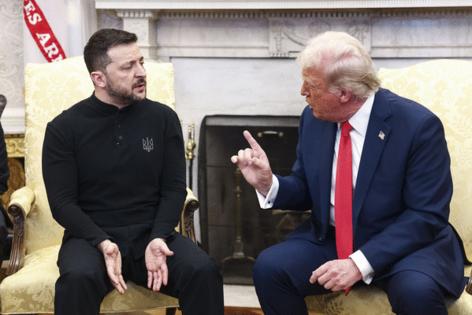Trump team has prepped options to pressure Russia to end war
Published in News & Features
U.S. officials have prepared a set of options for President Donald Trump to increase economic pressure on Russia, according to people familiar with the matter, as President Vladimir Putin drags his feet over attempts to end the war in Ukraine.
The people, who spoke on condition of anonymity to discuss private deliberations, cautioned that Trump has made no decision yet as diplomatic efforts were ongoing. They declined to detail what options are on the table and said any decision was for the president alone.
Ukraine and its allies have been urging the U.S. to increase pressure on Moscow, including through more restrictions on energy exports and oil revenues, to force it into a ceasefire on terms proposed by Trump. The U.S. and European Union have already imposed an unprecedented level of sanctions on Moscow since its February 2022 full-scale invasion, but have been unable to force Putin to stop the fighting.
The U.S. National Security Council and State Department didn’t respond to requests for comment. A spokesman for Trump’s special envoy Steve Witkoff, who met Putin last week, also didn’t respond.
The deliberations over next steps may be clouded by the abrupt sidelining of Trump’s national security adviser, Mike Waltz, and appointment of interim replacement Secretary of State Marco Rubio. It could help streamline U.S. strategy with Rubio holding both roles, as the White House’s approach to Ukraine has been driven by the various ideas of top officials, including Witkoff, who’s seen as more sympathetic to Russia’s positions.
Moscow has so far refused to accept U.S. demands for a permanent ceasefire, and Putin has maintained maximalist positions, including that Russia gain control of four Ukrainian regions it doesn’t fully occupy. Meanwhile, Ukrainian President Volodymyr Zelenskyy agreed to grant the U.S. control over some future resource revenues in order to maintain Trump’s support and has backed calls for an unconditional truce of at least 30 days.
U.S. Vice President JD Vance, who’s pushed Europe to manage its own regional security, said in an interview Thursday that Trump succeeded in getting the process started but that it’s up to Kyiv and Moscow to agree.
“Now that each side knows what the other’s terms for peace are, it’s going to be up to them to come to an agreement,” he said on Fox News, echoing earlier comments that the U.S. is willing to “walk away” if both sides don’t make concessions.
Trump, who’s seeking to end the war and initiate a broader remake of the U.S.-Russia economic relationship, has previously threatened to sanction Moscow if Putin doesn’t seriously engage in peace talks. On his Truth Social account last week, after meeting Zelenskyy, he wrote there’s “no reason for Putin to be shooting missiles into civilian areas” and “it makes me think that maybe he doesn’t want to stop the war,” before suggesting he could target Russia’s banking sector or impose so-called secondary sanctions.
Separately, Trump ally U.S. Sen. Lindsey Graham said earlier this week that he has the commitment of 72 colleagues for a bill that would enact “bone-crushing” new sanctions on Russia and tariffs on countries that buy its oil, gas and other key products if Putin doesn’t engage in serious talks to halt the war.
Those punishments would include a 500% tariff on imports from countries that buy Russian oil, petroleum products, natural gas or uranium, according to a draft of the bill.
As part of proposals shared with European allies last month, the U.S. would be ready to recognize Russian control of Crimea, the Black Sea peninsula Putin annexed from Ukraine in 2014. The deal would also freeze the conflict largely along existing battle lines, giving Russia effective control of parts of the other four Ukrainian regions it occupies.
Kyiv’s aspirations of joining NATO would be off the table, sanctions on Russia would be eventually lifted and Ukraine would receive security guarantees to ensure that any deal holds.
The Trump administration also wants Moscow to return Ukraine’s Zaporizhzhia nuclear power plant, the biggest in Europe, which it seized early in the war. The facility would then come under U.S. control and would supply energy to both sides.
Russian Foreign Minister Sergei Lavrov ruled that out in an interview with CBS’s "Face The Nation" broadcast Sunday, saying “I don’t think any change is conceivable.”
(Gregory White contributed to this report.)
©2025 Bloomberg L.P. Visit bloomberg.com. Distributed by Tribune Content Agency, LLC.







Comments